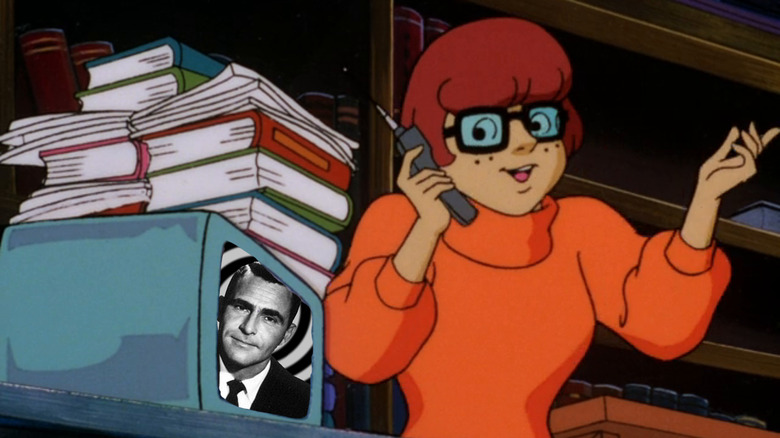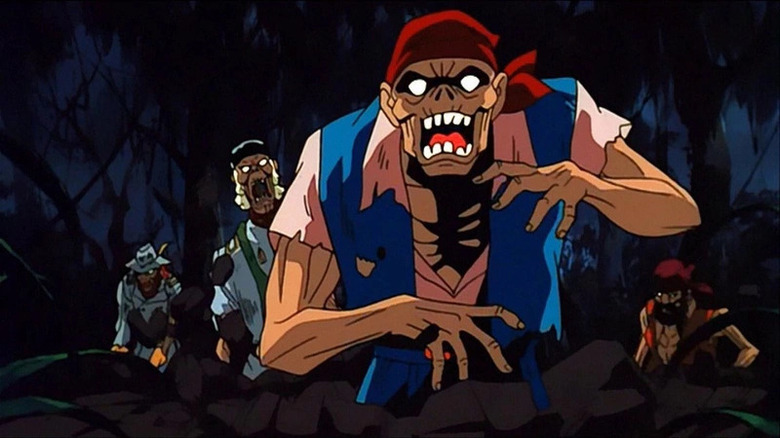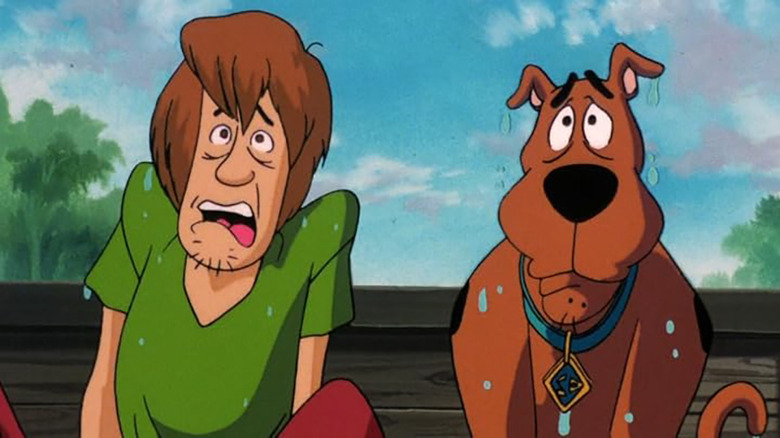The Best Scooby-Doo Movie Learned A Crucial Lesson From The Twilight Zone [Exclusive]
There are only two certainties in this world; death and that "Scooby-Doo on Zombie Island" is the best Scooby-Doo movie ever made. Scooby and the gang first debuted in 1969, but it wasn't until 1998 that "Zombie Island" set the standard for all things Scoob. It's scary, the animation is stunning, the voice-acting is top-notch, and every subsequent Scooby story has been chasing that high ever since. /Film's own Valerie Ettenhofer recently solidified her place as an expert on all things Mystery Incorporated with their oral history of the film and uncovered some production mysteries in the process.
Model Coordinator Lance Falk was interviewed as part of the piece and told Ettenhofer that "The Twilight Zone" was a major influence on not just the tone of the film, but also the structure. Lest we forget, most episodes of "Scooby-Doo" are roughly 20 minutes, which has an entirely different storytelling structure than that of a feature-length film. During early discussions about the film's plot, director Jim Stenstrum expressed interest in getting rid of the "mask reveal" trope synonymous with Scooby-Doo mystery plots. "It's old. It's tired [...] I want to do real monsters," Falk recalled Stenstrum saying.
Writer (and Hanna-Barbera legend) Glenn Leopold wasn't totally sold on the idea, noting, "The fans want to see that because that's what Scooby-Doo has always been." Supervising producer/story writer Davis Doi also had some hesitation, but understood where Stenstrum was coming from. "This is true, but you can yank people's chains for about a half an hour, but you can't do it for an hour and a half and have it be a fake," Falk remembered Doi saying.
The way to fix the problem? Emulate "The Twilight Zone.
'You want to be engaged in the story'
Lance Falk, as is the case with most genre creatives, was a big fan of the original "Twilight Zone" series, and infinitely prefers the half-hour version of the series. "That's the only version that really works because the stories are structured like jokes," he says. Horror and comedy are often viewed as two sides of the same coin, with setting up a scare reveal structured similarly to that of a hilarious joke. Falk seems to agree as he said:
"When you get to that punchline, you don't want to have an hour to think about what the punchline means. You want to just be engaged in the story, and when it hits you, it hits you. Some people will get there first, but mainly you won't. But when they started doing hour 'Twilight Zones,' which they even did in the original run, they're dragged out."
Falk then pitched the idea of marrying both the old-school Scooby style with something completely new, by incorporating the human-in-a-mask reveal with that of real monsters. "That way, you can actually do things, like you think something is about one part of the story, but it's really about the other," he said. "If you play fair with the audience, you don't give them false clues, but you do kind of lead them down false assumptions." He viewed this as a way of being able to "have our cake and eat it too," because not only would the fans be happy, but those working on the film would be allowed to tell a better story.
Did it work?
"Scooby-Doo on Zombie Island" is not just a great expansion of the familiar characters, but also one of the best zombie films of the 1990s, regardless of medium. The film opens with the crew being chased around a decaying castle, and it feels exactly like another episode of "Scooby-Doo, Where Are You!" It lulls the audience into a sense of familiarity before completely pulling the rug out from underneath. We learn the team has been separated for a few years, and the footage we just saw was something Daphne Blake was recounting on a talk show. However, in the interest of "getting the band back together," they all join forces once again, as adults, looking to finally experience a real paranormal encounter, instead of just another person in a rubber mask.
This leads them to the titular Zombie Island, where they meet actual zombies, actual ghost pirates, and actual cat people, and are faced with legitimate life-and-death situations. Honestly, it would have made for an earth-shattering twist, but the film was marketed as the first Scooby adventure with "real" monsters, so even as an eight-year-old, I already knew what I was getting myself into. Even still, it didn't matter, because this meant audiences had no idea what was at stake for the crew. There was no way to predict how the film would end because there was no formula or decades of familiarity to fall back on. It honestly feels as if this is a Scooby-Doo-themed episode of "The Twilight Zone," because it subverts so many of our expectations of what makes a Scooby story.
25 years later, there have been some pretty phenomenal "Scooby-Doo" series and films (I am begging people to watch "Scooby-Doo: Mystery Incorporated"), but "Scooby-Doo on Zombie Island" remains the gold standard.


